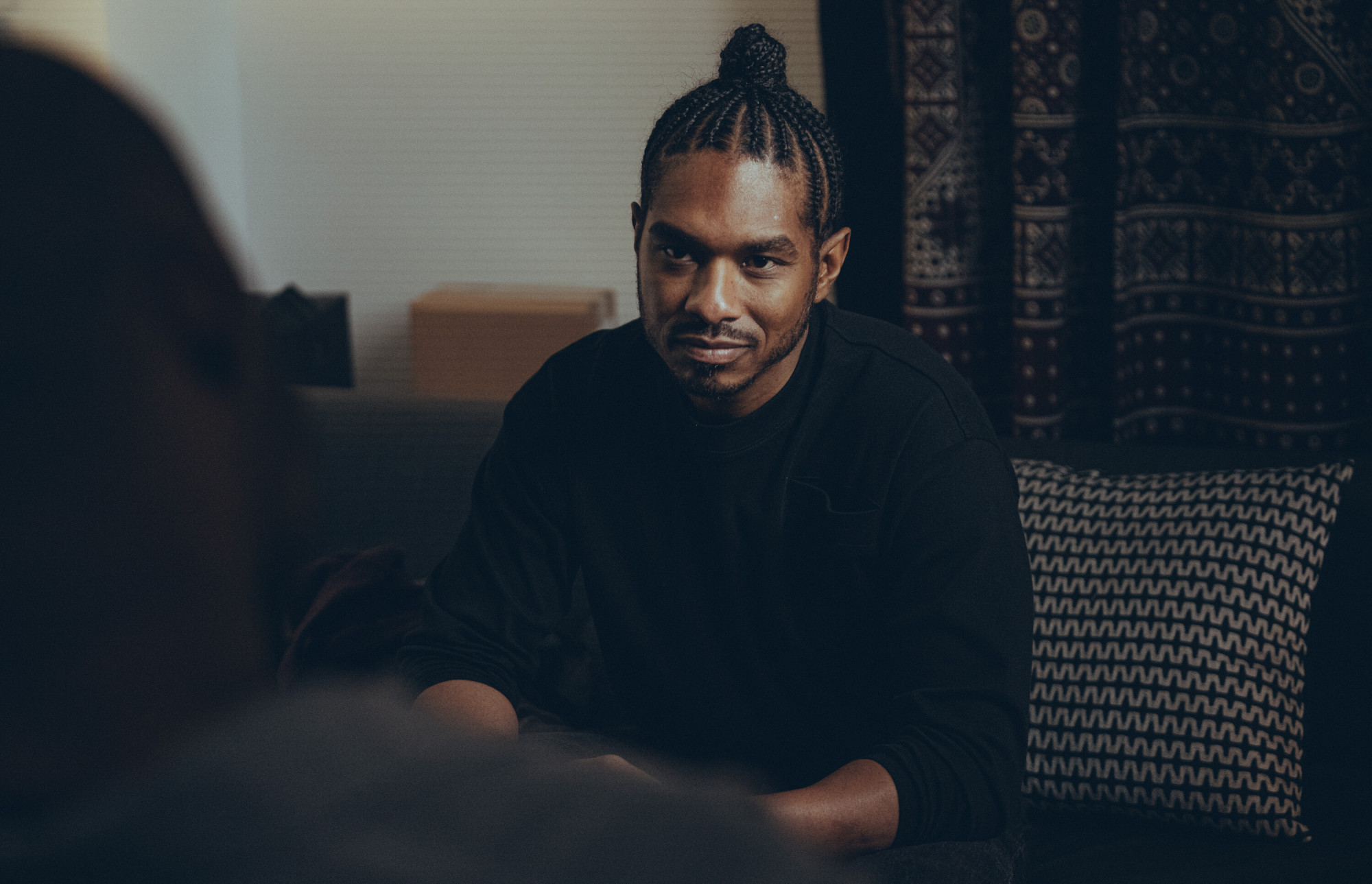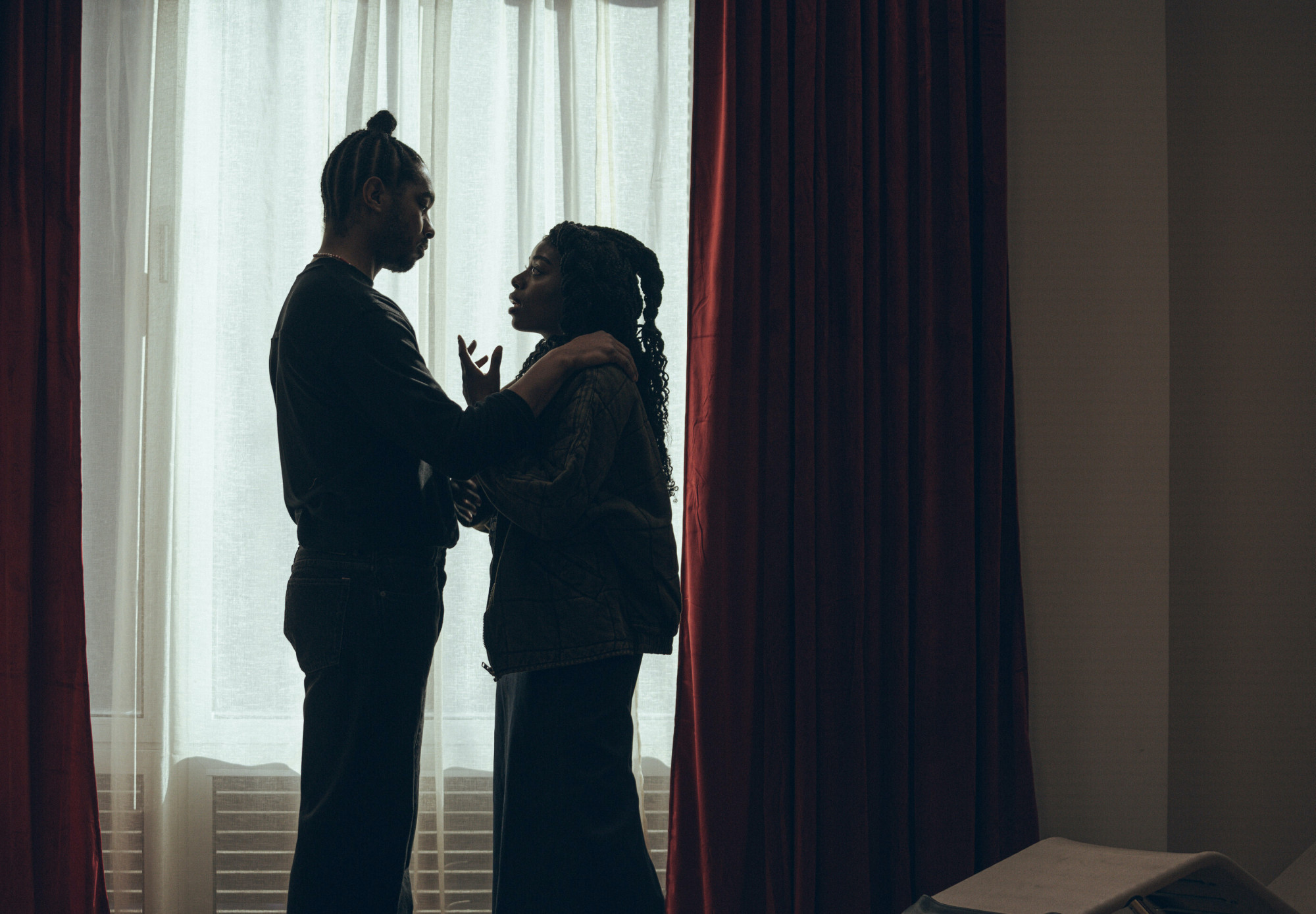
Photograph of Terence Nance by Rog Walker/HBO
Terence Nance's Interdimensional Healing
On the cinematic and spiritual references permeating season two of "Random Acts of Flyness"
By Clarissa Brooks
The spiritual practice of Black liberation is the largest task at hand. It requires pulling at the root in every aspect of our lives. Through his sharpest storytelling to date, Terence Nance gives his audience various possibilities on how to face the challenge head-on.
Nance is a director, actor, producer, and the creative leader of the hyper-surrealist HBO series Random Acts of Flyness, which returned for a second season in December 2022. SubtitledThe Parable of the Pirate and the King, the new season is a patchwork of tales, fables, and prayers to the world built by Nance and his robust list of collaborators. Among other things, the new season speaks to the discipline of healing when we allow every dimensional version of ourselves to come along for the ride.
The first season of Random Acts premiered on HBO in 2018. It won a Peabody Award for its late-night variety-show approach to narrative, which reflected the daily experience of overstimulation that is often numbed by standard TV programming. With Nance’s collage-like structure—going from animation to stop-motion graphics and then back to in-scene action—Random Acts can seem focused on chaos and nonlinear storytelling, but its second season sharpens itself by using African spiritual practices of ritual from Ifá and Southern gothic aesthetics to complicate the healing journey that its main characters, Terence and Najja, embark on together.
The Parable of the Pirate and the King hinges on the intimate relationship between artist and app developer Terence Nance (played by Nance) and his longtime partner and video game creator, Najja Freeman (Alicia Pilgrim). Across six episodes, the couple grows apart and together while seeking liberation from the generational wounds that impact every aspect of their lives. We are given storytelling points around reparations and the white supremacist cinematic canon, and we meet the selves of Terence and Najja that make them jealous, resentful, and, at times, anxious about the possibility of building a life together.

Rog Walker/HBO
Ifá, an African diasporic religion based in the Yoruba people of West Africa, is central to the ritual practices that Nance references throughout the new season. While Ifá and the diasporic traditional religions vary in specificity, they all center around a supreme figure, Olodumare, with deities known as Orishas taking various forms. These Orishas each reflect a different aspect of nature, such as fire, rebirth, agriculture, and water. The Orishas serve as intermediates between human beings and the creator. Practitioners of the faith can only access the deities’ wisdom and counsel through ritualistic practice. It is through these rituals that Terence and Najja work though their personal, political, and familial pains. The aesthetic vignettes of ritual-making take us through how these characters hope to heal their pain-bodies, or wounded selves. For Najja’s character, this often involves turning to fire as a portal for communication with her ancestors.
We see this clearly during Najja's rebirthing sequence in episode three, when she attempts to undo the family secret of her mother's wound—but can only complete the process by giving an offering to XXXX, played by Saul Williams, who represents the spirit known as Eleguá. As one of the show's narrators, Williams is shown wearing colors associated with the Orisha Eleguá: black and red. Throughout the season, XXXX acts as the “lord of the crossroads,” as Elegua is sometimes called. “And you ain't got no toll!” he says, scolding Najja for not having her offerings to enter her healing journey. “Everybody know that there is a troll near every bridge and you gotta pay that nigga in order to cross the bridge.”
The Ifá religion has increased in popularity over the last few years as young Black people return to spiritual practices that were stolen and demonized during slavery. With the rise in access to political education during the COVID-19 pandemic, Black descendants of slavery globally are returning to the spiritual practices of diasporic traditional religions to connect with their political and ancestral birthrights. “I spent a lot of my life wondering who I was, and where I came from, but now I don’t question that,” Porsche Little, a Brooklyn-based artist and practitioner of African spirituality, explained to Vox in an article about the recent uptick of these religious practices. In season two of Random Acts, Nance highlights the importance of keeping these traditions alive, paying close attention to how these religions reside in their homelands: the American South, continental Africa, and the Caribbean. In Random Acts, Terence returns to the South to take back his family land in Texas, while Najja travels to Liberia, both hoping to answer the spiritual demands of their respective families' wounds and legacies of land and reparation.
Nance’s experience growing up in the Black church in Dallas aligns with his references to African spiritual religions; he has noted that those practices have existed in Black life no matter the persecution. “I think the Black church is African spirituality, explicitly, that is synchronized with, maybe at the time, what could be understood to be a genocidal deployment of white supremacist puritanical Christian ideology,” he explained to ALL ARTS. In that same interview, Nance cites the filmmaker Barbara McCullough, director of the 1981 experimental film Shopping Bag Spirits and Freeway Fetishes: Reflections on Ritual Space, as a creative ancestor whose work influenced The Parable of the Pirate and the King. “She talks about ritual objects being art objects or learning about certain African societies… and I think that, in some way, my own observation of my life as an artist has been me observing what the role of the artist is in the present moment in contemporary American society.” Nance and his collaborators make thematic choices to meld the worlds of diasporic religions, the Black church, and the practices of ritual-making that are cleverly hidden in Black culture to remind Black people that our origins are always in plain sight.
The magic of Random Acts lies in its variety, with Nance and his team using everything from game sequences, dancing fire figurines, animated fables, and documentary-style montages to move the story along in dimension and scope. Co-writer Jamund Washington is adept at creating characters we can't wholly root for: They are as flawed, brilliant, and unaware as we all are. Through complex characterization—like Najja’s push for sharp relationship boundaries, all while keeping Terence nearby—Washington and the Random Acts writing room build characters that live in us, characters who are scared, trying their very best, and living through various contradictions all at once.
One of the series’s strongest moments happens in episode two, when an argument between Terence and Najja is expanded. The characters' voices overlap and their shadow selves are superimposed in the background to elicit the feeling of emotional shift happening unconsciously. It speaks to how human beings show and hide our varied forms in moments of conflict. Scenes like this one highlight the power of collaboration: Random Acts’s cinematic universe—built along with Nance's longtime collaborator and director of photography, Shawn Peters—makes the spiritual, multi-dimensional, and political worlds run together as nonlinearly as they exist in real time. On first watch, this style of programming is disorienting to say the least, but it sits on our spirit and it cuddles up next to us at night as we think through all the ways our best and worst selves speak for us unconsciously when we’re at our most vulnerable.
Each character in Random Acts has generations-long work of renaming, rebirthing, and living in different timescapes to heal the centuries of genocide of Black people in the physical and spiritual realms. The second season, with its focus on African spirituality and political commentary, recalls 1994’s Cosmic Slop, a science fiction anthology series hosted by Parliament-Funkadelic’s George Clinton. Cosmic Slop delved into similar realms, using short stories about how the genocide of Black people is an everyday reality that we are not allowed to name as such. Random Acts renders white people invisible while never ignoring the histories of genocide, colonialism, and anti-blackness that impact its characters’ abilities to access their healing.
The rhythm of the show plays well into Nance’s Southern roots; the pace of feeling and texture that he deploys is reminiscent of DJ Screw’s ability to bend time, play with memory, and make other worlds. Whether he’s chopping up a scene of conflict between Najja and Terence, or screwing the vocals of XXXX as he explains the fictional “Bitch Better Have My Money” app, Nance uses these interpolations of distortion and repetition to reflect how memory, in all its forms, can move us in and out of time. Though DJ Screw and the Screwed Up Click’s influence was birthed in Houston, the imprint of Dallas and the various homelands of Texas hip-hop are evident in the show’s ability to melt time with ease.
Although much of first half of the new season is based in Brooklyn, the main characters eventually embark on their own familial healing journeys, with Naijja returning to Liberia to face a legacy of war and Terence facing the theft and erasure of his familial name in the face of a new land grab in Hays County, Texas. The modern day struggle for reparations and land acquisition by formerly enslaved Black people is happening in real time. In January 2023, Rep. Sheila Jackson once again reintroduced H.R. 40, a 34-year-old bill to study and make suggestions about the material impacts of chattel slavery and white supremacy on descendants of formerly enslaved Black people. “It is time for this legislation, as a response to the inaction of [this] Nation, to be implemented as an Executive Order by the President of the United States,” Jackson wrote recently on Twitter. In Random Acts, Terence and Najja’s story arcs show how the very real return to the land is just one step in a longer journey that crosses multiple planes of healing.
While some of the show’s criticism in 2018 revolved around it being too focused on making white people empathize with the Black experience, Nance requires viewers to watch the second season with new eyes. The Parable of the Pirate and the King asks Black people to sit in the weight of our liberation and the cost of world-building when we take our healing seriously though ritual. The new series ends where it rightfully should, with Terence hand in hand with Najja, declaring in front of their family and ancestral spirits: “I release this hungry motherfucking ghost of greed.” Random Acts does the work of layering feeling, memory, and time to explore the nerve that is consciousness—and not just in the political understanding of the term, but in the idea that we as Black people are entitled to have every version of ourselves touch freedom in this lifetime.



